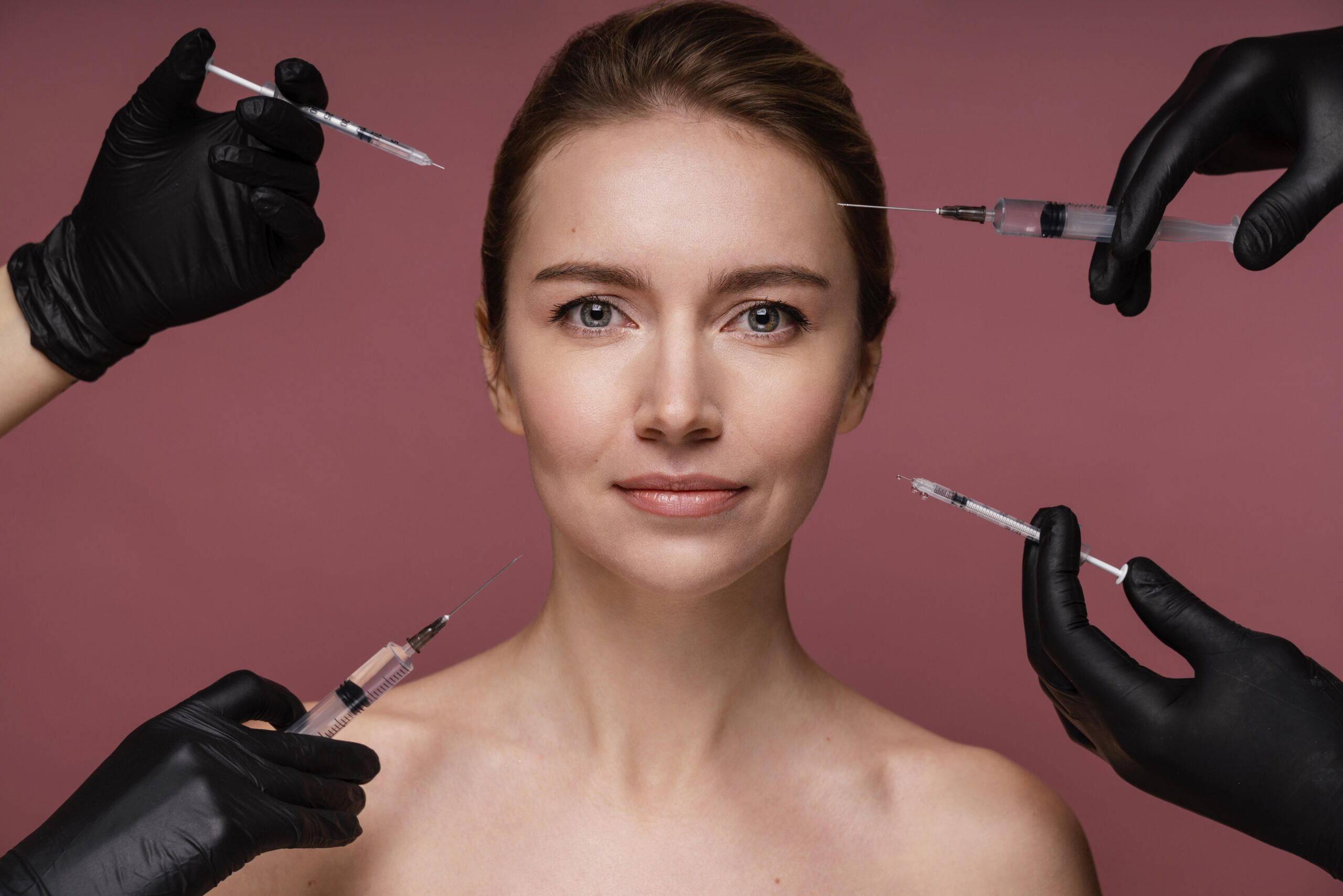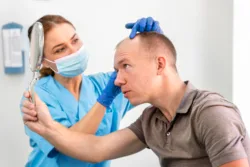Injectables treatment like botox, dermal fillers, and other cosmetic procedures have grown in popularity as non-invasive facial rejuvenation methods. Whether you’re thinking about Botox for fine lines, dermal fillers for volume loss, or another injectable treatment, it’s important to know what to do both before and after your procedure to guarantee the best possible outcome and the fewest possible side effects.
In this blog, we will discuss what you should and shouldn’t do before and after receiving injectable treatments.
Do’s and Don’ts Before Injectables Treatment:
1. Do: Choose an experienced surgeon
A professional surgeon with a lot of experience, a board-certified dermatologist, or a plastic surgeon should always be chosen. Check their credentials, reviews, and certifications. Because of their attention to detail and understanding of facial structure, professional injectors lower the chance of problems.
2. Do: Stay hydrated
Before your treatment, make sure you drink a lot of water. Hydrating the skin properly maintains its smoothness and can enhance the effects of dermal fillers. In the days before your treatment, try to consume 8 to 10 glasses of water each day.
3. Do: Talk about your medical history
Discuss your medical history honestly with your operator. Be sure to disclose to them any allergies, pre-existing conditions, and prior cosmetic treatments. This guarantees that the therapy is secure and customized to meet your unique requirements.
4. Do: Make a Plan for Downtime
It is advisable to plan your treatment during a time when you can relax even though injectables often have little recovery time. Avoid any significant social gatherings for at least 24 to 48 hours following the procedure to allow for the healing of any redness or swelling.
5. Don’t: Avoid using blood thinners
Avoid taking medications that thin the blood five to seven days prior to the procedure, such as ibuprofen, aspirin, or some supplements including ginkgo biloba, vitamin E, and fish oil. These may make swelling or bruises more likely. See your doctor before quitting any blood thinners you are currently taking.
6. Don’t: Avoid drinking alcohol
Alcohol may increase the risk of bruising and swelling during therapy by causing a decrease in blood or the widening of blood vessels. The result of the treatment may also be impacted if it dehydrates your skin. To reduce these risks, alcohol should be avoided for at least 24 to 48 hours before the surgery. Because it could impact your healing process.
7. Don’t: Avoid facial treatments
It’s crucial to avoid scheduling laser resurfacing, chemical peels, or micro needling on the same day as your injectables. It is recommended to avoid these procedures at least 1-2 weeks before your injectable therapy because they may cause skin irritation or delayed healing.
8. Don’t: Expect immediate results
Although dermal fillers and injectables like Botox can produce immediate results, it’s crucial to set achievable goals. Botox results can take up to 7–14 days to fully manifest, and some procedures, particularly fillers, may take a few days to settle.
Do’s and Don’ts After Injectables Treatment:
1. Do’s: Carefully follow the post-treatment instructions
Following your surgery, you will get detailed care instructions from your provider. This could include guidance on how to deal with bruising and swelling as well as when to make follow-up appointments. To get the best results, you must adhere to these recommendations, which are particular to your needs and the type of treatment you received.
2. Do’s: Use Ice Packs to Reduce Bruising and Swelling
It’s common to have some redness or swelling following the operation. To reduce this, especially during the first 24 hours, apply a cloth-wrapped ice pack to the treated area for 10 to 15 minutes at a time. The cold compress can lessen the likelihood of bruising, soothe discomfort, and reduce inflammation. To avoid irritation, avoid putting ice immediately on your skin and allow your skin to acclimate between applications.
3. Do’s: Use sunscreen
After injectables treatment, your skin becomes more sensitive to the sun, thus sunscreen is necessary. Apply a thick layer of a broad-spectrum sunscreen with at least SPF 30 to every exposed part of your face. Keeping your skin shielded from UV radiation increases the life of your injectables, helps stop additional inflammation, and guards against hyperpigmentation. If you intend to spend a lot of time outside, reapply sunblock every two hours.
4. Do’s: Sleep on your back
Try sleeping on your back with your head slightly raised for the first several nights following treatment. This minimizes the possibility of applying pressure on your face, which could move the injectables or result in bruises. To be comfortable and keep your head in a steady position as you sleep, think about using additional pillows to prop it up.
5. Do’s: Drink plenty of water and eat healthy foods.
Maintaining proper hydration is essential for fostering the best possible skin health and a quicker recovery. Water consumption promotes healing and keeps the skin supple. Eat nutrient-dense foods that promote skin healing, such as fruits, vegetables, lean meats, and healthy fats, in addition to drinking enough water. You will feel your best and recover more quickly with a well-balanced diet.
6. Don’t: Avoid massaging, rubbing, or touching the treated area.
Avoid touching, rubbing, or massaging the regions where the injectables were delivered for at least 24 hours. This is particularly crucial for neurotoxins like Botox. The product may shift or have unexpected effects if you touch or massage the region. It’s best to talk to your provider about any discomfort you experience rather than trying to resolve it on your own.
7. Avoid Doing Heavy Exercise
It’s crucial to avoid strenuous exercise for 24 to 48 hours following injectables, including jogging, heavy lifting, hot yoga, and anything that makes you perspire a lot. Exercise can cause more bruising, edema, or a faster breakdown of the injectable chemical since it increases blood flow. For optimal results, allow your body to relax and recuperate throughout the first several days.
8. Avoid Putting on Makeup Immediately
For the first 24 hours after treatment, you should refrain from wearing makeup, even if you might feel the need to hide any redness or bruises. Makeup can increase the risk of discomfort or infection by clogging pores and introducing bacteria into the skin. Meanwhile, use calming skincare products and let your skin breathe. To reduce the chance of contamination, make sure your brushes or sponges are clean if you must use makeup after this period.
9. Take Care of Yourself After Treatment
For optimal results, proper post-care is essential. Refrain from rushing through the processes that your practitioner has laid forth. Important aftercare steps like applying ice packs or sunscreen should not be skipped as this could raise the risk of problems or produce less than ideal results. Have faith in the process and take your recuperation seriously.
10. Avoid Alcohol Use during the First 24 to 48 Hours
Alcohol thins the blood and makes swelling and bruises more likely. After your treatment, stay away from alcohol for at least 24 to 48 hours to allow your body the best chance to recover. Alcohol can enlarge your blood vessels, which may result in more obvious adverse effects, in addition to interfering with the healing process.
Conclusion:
Injectables treatment can give you a more young, refreshed look, but the best benefits come from taking care of yourself both before and after the procedure. Following these instructions will assist to guarantee that your injectables settle elegantly, reduce side effects, and maximize the duration of the results.
If you have any questions about it, please visit Aestheticure. Our best expertise and experienced surgeons will provide you with the best information and proper care and also they will guide you through the procedure, provide you with thoughtful, honest answers to all of your questions. For more information or to schedule a consultation, feel free to Contact Us!







